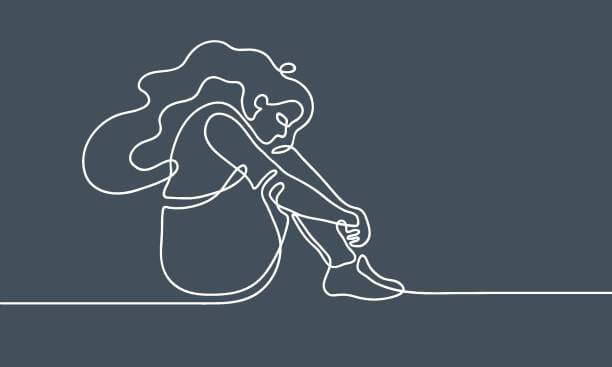
by Anastasia Chrysostom | Jun 17, 2021 | Uncategorized
by Jennifer Hama, LPC, CPCS
Lots of people struggle with boundaries, you’re not alone, and most struggle for the very same reason.
You’re going about it backwards
Often, we start by drawing boundaries around the behaviors that we don’t want to see or behaviors we want to see (ie “Don’t talk to me like that again”). Now, this isn’t necessarily a bad way to start. But, most people don’t have a problem saying that, most people have a problem with what to do when it happens again.
Start with how you plan to enforce the boundary if it happens again.

Will you end the phone call?
Will you leave the location?
Will you end the relationship?
All of these are okay options, if you will actually follow through. If you set a boundary and a consequence you don’t plan on enforcing, you end up damaging the relationship.
Yep, that’s hard to hear because they are the ones not following the boundary…but then again…neither are you. And you are responsible for your behavior, not theirs.
Next, decide with if you will communicate this boundary and consequence ahead of time.
You don’t have to. You can choose to wait until the next time it happens or you can choose to have a conversation prior. This can depend on a variety of factors. Think about the follow questions. How might the other person will respond? Is this a pattern of behavior or is this a one time thing? Is it likely you will see this person again? Use the answers to these questions to help guide you.
 Then, develop a list of specific behaviors that cross the boundary
Then, develop a list of specific behaviors that cross the boundary
Instead of saying “Don’t talk to me like that again.” What was it specifically? Was it tone? Was it volume? Was it certain words?
Be specific. Disrespect can mean a lot of things to a lot of people, be specific in what you identify as disrespectful.
Last, move forward with your plan.
You’ve got all the missing pieces now. Move forward with your plan and practice to make your boundaries more effective.
You won’t get it right the first time and that’s ok. Think of it like an experiment: what worked, what didn’t. Learn what works best for you and change accordingly.
Jennifer Hama, LPC, CPCS I have a core belief that a sense of humor is essential to living a fulfilling life. And I like to recognize mine. Regularly. I hate laundry and psychobabble, but I love uncensored real talk. It’s necessary for you to know this. Also, I have a white board that I go everywhere with. While it’s entertaining to watch me roll it around the office while trying not to trip, it’s also a powerful therapy tool, helping you visualize your struggles and brainstorm solutions. I don’t do “therapy speak, ” I shoot straight, and believe in giving you practical tools to help you change your life
Learn more about Jennifer and CBT, Here
Follow us on Facebook, Instagram and Pinterest to see more advice from our therapists!
Facebook InstagramPinterest
Photo Credit found on Pixels.com: Featured Image @christianduong First Photo @AlexGreen Third Photo @monstera_production

by Anastasia Chrysostom | Feb 15, 2021 | Uncategorized
by Danielle Edwards, MSW, LCSW
I watched a recent episode of “This is Us” where one of the characters, Randall, finds out that his birth mother did not die of an overdose shortly after his birth as he has always believed. He finds out that she survived the overdose and died just 5 short years ago. This news, of course, opened up old wounds and poured salt into them. As a newborn Randall was adopted into a white family who loves him. Although his adopted family is great, he still struggles with grief, attachment, anxiety and identity issues. If you’ve ever watched the show then you already know it is too much to unpack here. However, I was so excited to watch this part of his journey.
In an effort to process the wide-ranging emotions of his new found connection to his mother, Randall decides to wade in the same waters that he had just recently learned his mother used to wade in when she needed to work out her pain. It was so beautiful and touching. I was all for it until his mother “appeared” in the water with him. I’ll be honest my first thoughts were, “This is too much. This doesn’t fit with this show. This is corny. Why did they need to go the supernatural route?” Before I could get the words fully off my tongue I connected with the supernaturalness of it all and began to weep. I wept because I connected with my own lived grief experience and remembered how my loss left me desperate for connection –

even if it came in the supernatural. This is grief.
Dictionary.com describes grief as, “keen mental suffering or distress over affliction or loss; sharp sorrow; painful regret.” Grief is more than the period of mourning after a loss. Grief waxes and wanes. It can be unsuspecting and sneak up on you when you least expect it. It can make you replay and rethink decisions wondering if there is anything you could have done to change the outcome.
Lastly, grief isn’t just about dying. Any loss can be grieved.
Maybe you or a loved one has been recently diagnosed with a terminal or chronic illness that will change the way you’ve always done things. A loved one’s addiction. Job loss. Retirement. Divorce. These experiences and others can all elicit a grief response. This is normal.
Sometimes you feel like you need permission to grieve because you feel like “enough” time has passed. Maybe you think that you shouldn’t feel this way about whatever you’ve lost. Maybe you feel guilty or responsible for your loss. Whatever it is I want to listen and help you process it, work through it, heal, get unstuck, etc…
This is therapy.
I am a clinical social worker who has worked for 6 years in the medical field helping individuals and families navigate the impact of chronic illness on themselves as well as the family system. This work has allowed me to help people work through depression, anxiety, grief, trauma, burnout and crisis. I also have experience working with grieving children, domestic violence survivors and accountability courts. I believe that my diverse experiences will prove beneficial to our therapeutic relationship.
Follow us on Facebook, Instagram and Pinterest to see more advice from our therapists!
Facebook Instagram Pinterest

by Anastasia Chrysostom | Jun 16, 2020 | Uncategorized
by Nyambura Kihato, M.Ed, MA, LPC, CCTP
I was at a restaurant waiting for my friends to show up for our dinner date when I met a delightful woman at the bar who struck up a conversation with me. I asked her whether she was also waiting for someone, and she told me, no, she was out alone celebrating her 58th birthday. After wishing her a happy birthday and exchanging pleasantries, she talked about the freedom she feels now that she is in her late fifties, and how she wished she had experienced this “life giving, don’t-give-a-damn freedom” earlier in life. She went on to tell me how it took being in her fifties, with her children grown and her husband dead, for her to feel okay about spending time alone, treating herself to dinners and movies, taking walks alone, sleeping alone. She was forced into learning to appreciate solitude, rather than choosing it willingly. We had a lovely conversation about the value of enjoying one’s own company at any age.
It got me thinking about enjoying solitude.
I appreciate how in some ways, we as a society are becoming more open-minded and accepting of solitude: meditation, silent retreats, and journaling are now commonplace solitary activities.
Travel groups advertise trips for the solo traveler. Young folks are delaying marriage or choosing to remain single. You no longer have to be a monastic or widow/widower to justify your solitude. I love that instead of the heavy, judgmental term “spinster”, we now use the more fun and free “bachelorette” to describe single women, or, my favorite: “singleton” (shout out to Bridget Jones).
Yet in other ways, we are still wary of solitude and being single; even the words “unmarried” and “childless” have negative connotations (especially for women), implying that something is missing or you are somehow incomplete if you are single or have no kids. Certainly loneliness is painful and can be emotionally and physically devastating. As humans, we are wired for social connections with others, and we benefit when we nurture our relationships. Extreme loneliness can contribute to chronic illnesses, depression, despair, alienation, even suicide, which is the ultimate loneliness.
But being alone does not necessarily mean being lonely. It takes practice, but we can learn to enjoy our own company without constantly needing to be with others (or with our electronic devices).

Enjoying your own company
But what if being alone is unbearable? I’m reminded of the joke:
My mind is like a bad neighborhood – I never go there alone.
If you are unable to tolerate physical or emotional solitude, need constant distractions, and tend to fill your life with so many events, dates, friends, work, screen time, etc. that you are left feeling drained and empty, then it may be useful to ask yourself whether you are using these things as defenses to avoid some underlying problem. Sometimes we may need a life coach or therapist to help us explore the inner motives for our outer behavior, and the negative self-talk or anxiety that makes us fill our headspace and lives with too many activities, people, and things.
With practice, we can relearn the enjoyment of solitude. We were good at it as kids. We may remember this from our own childhood or from watching a child play alone for hours, delighting in every moment, unconcerned or unaware of the gaze of others.
So don’t wait until friends and loved ones are gone or are unavailable.
Go alone to that movie you’ve been dying to watch, treat yourself to a solo dinner at a nice restaurant (with the phone turned off! – phones are not dinner companions), sit at the mall and people watch, take yourself to an art show, museum, or play, or just stay home with the sole purpose of having fun hanging out with yourself. Knock yourself out.
Nyambura Kihato, M.Ed, MA, LPC, CCTP I earned my Bachelor of Education in German Language and Literature from Kenyatta University in Kenya. I studied German further at the Goethe-Institut Nairobi, and in Luebeck, Germany. I went to graduate school at the University of Hull, UK, where I obtained a Master of Education in Counseling and Child Development and Learning. I taught for several years in Kenya before coming to the United States to study at the California School of Professional Psychology, San Diego, graduating with an M.A. in Counseling Psychology. I am a Licensed Professional Counselor (LPC) in the state of Georgia, trained in EMDR (Eye Movement Desensitization and Reprocessing), and am a Certified Clinical Trauma Professional (CCTP). I currently serve on the board of the Jung Society of Atlanta and am training to become a Jungian analyst.
Follow us on Facebook, Instagram and Pinterest to see more advice from our therapists!
Facebook Instagram Pinterest
Cheapest prices Pharmacy. Dapoxetine Tablets Price. Get Free Delivery On Prescriptions. Cheap Viagra With Dapoxetine.

by Anastasia Chrysostom | Apr 8, 2020 | Uncategorized
by Julie Coker, MS, EdS, LPC
We’re all worried about certain areas of our lives during this pandemic and wonder what’s next. And the triggers for our anxiety can be many and varied. These include seeing the updated number of cases on the news, concerns about finances, and stress in relationships, as we’re largely more stuck around each other in our shelter in place circumstances.
Today we are going to go through a short breathing exercise. This exercise can really help when you’re feeling anxious or overwhelmed.
I call it “Dropping Anchor.” When our anxiety spikes, we can become so caught up in the physical sensations, thoughts, and emotions that we lose contact with the present moment – even to the point of feeling disoriented and unable to find solid ground.
At that time, we need something that reconnects us to our current experience: both where we are in space and to our bodies.

Below is a step by step guide to shifting the focus to your breathing, calming those anxiety levels, and feeling just more grounded in general:
- Sit comfortably, back straight, with feet firmly planted on the floor just slightly in front of your knees, hands resting palms down on the lap, eyes closed.
- Inhale for five (5) seconds; hold for five (5) seconds; and exhale for five (5) seconds. Repeat the procedure seven times for a total of eight rounds. As the breathing slows, you may choose to extend the length of time you hold the breath and the length of time you exhale.
- At the end of the eighth cycle, exhale explosively and sit quietly for a moment, allowing the breath to return to normal but remaining focused on the in breath and the out breath. If you get distracted by thoughts or your surroundings, this is totally normal. You can gently return the focus back to your breathing.
- Now begin to pay attention to where your feet are touching the floor. Notice the feeling of your feet in their shoes or socks, or your bare feet touching carpet. Particularly notice all points of contact and the solidness of the ground below you.
- As you take your next in breath, imagine that air traveling from the lungs down to the bottom of the feet. This then extends below the surface, going deeper down, further connecting you to the earth. Sometimes it can helpful to visualize this like strong, thick roots spreading out through the soil.
- Take as much time as you need in this exercise. If you notice the anxiety returning, you can go back to the 5-5-5 breathing pattern to relax the body and mind.
From an early age, I had a deep curiosity about the world around me and, more specifically, people: I was both an avid reader and frequent observer of everything that came my way. I was fascinated by the variety of human experience, the challenges that people are able to overcome, and that process of metamorphosis. I feel particularly drawn to working with men and women struggling with anxiety and depression and experiencing challenges due to difficult life transitions. I also enjoy helping new therapists in their professional development through group and individual supervision. I have found it is important to use a wide variety of techniques that tap into the creativity and individuality of each client. Therapy is a collaborative process and I feel honored to help you find your own path for growth.
Excipients : Cellulose microcristalline, Hydrogénophosphate de calcium anhydre, Croscarmellose de sodium, Stéarate de magnésium, Hypromellose, Dioxyde de titane E , Lactose, Triacétine, Laque d’aluminium contenant de l’indigotine E , qsp 1 comprimé pelliculé. cialispascherfr24.com Sildénafil mg Comprimés pelliculés x Comprimés pelliculés x Sildénafil Zentiva mg Comprimés x Comprimés x Gel 80 g.


 Then, develop a list of specific behaviors that cross the boundary
Then, develop a list of specific behaviors that cross the boundary










Recent Comments